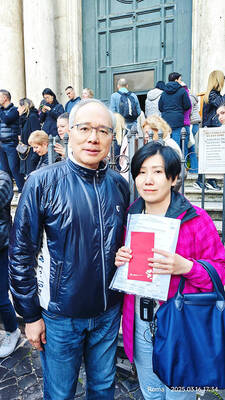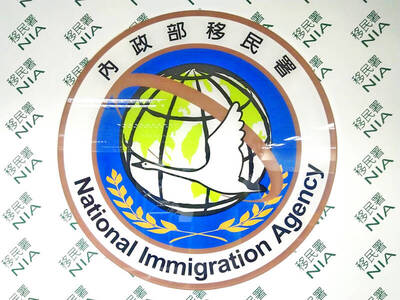The Legislative Yuan on Thursday passed an amendment that would make it possible for criminal offenders with mental issues to be kept in psychiatric detention beyond the existing five-year limit, placing no cap on how long they can be held.
Article 87 of the Criminal Code stipulates that criminal offenders who are not convicted or whose sentences are reduced because of diminished responsibility can be held in “custodial protection” for up to five years.
Thursday’s amendment allows the period of custodial protection to be extended once for three years or less, followed by extensions of up to one year each, without placing a limit on the number of extensions allowed.
Prosecutors would be required to get permission from a court for each extension, and the need for keeping the detainee under custodial protection must be re-evaluated annually, during the initial five-year period as well as during later extensions.
The existing law only stipulates that a court could revoke the detention order at any time if there is evidence that it is no longer necessary.
The amendment was drafted in response to a fatal stabbing of a railway police officer in 2019 by a passenger surnamed Cheng (鄭) who had a history of schizophrenia.
In April 2020, the Chiayi District Court found Cheng not guilty of murder on grounds of diminished responsibility and ordered him to undergo treatment for mental health issues while in custodial protection for five years.
The verdict sparked widespread outrage, with many members of the public saying that the defendant was being let off too lightly, leading to calls for longer periods of psychiatric detention for criminal offenders with mental disabilities.
New Power Party Legislator Wang Wan-yu (王婉諭), whose daughter was murdered in 2016 by a man who was later given a life sentence rather than the death penalty because he had a mental illness, criticized Thursday’s revision, saying that it would lead to undesired outcomes.
People with mental illnesses who commit less serious crimes would not admit to their mental issues, as they would fear being kept in psychiatric detention indefinitely, she argued.
They would avoid getting care and might be out of reach for the nation’s mental health network, resulting in their condition worsening, she said.
“Couldn’t that lead to another tragedy similar to what happened to me?” she asked.
Others suggested that having no upper limit on the total time spent in psychiatric detention could contravene a person’s human rights and be unconstitutional.
However, Democratic Progressive Party caucus whip Ker Chien-ming (柯建銘) said that the yearly court reviews would prevent baseless indefinite detentions.
Increasing the review frequency can balance human rights protections and social order considerations, he said.
Other amendments were passed on Thursday that would allow a suspect or defendant to be detained during an investigation or trial in a way that would be more beneficial to their health, proponents said.
A revision to the Code of Criminal Procedure (刑事訴訟法) institutes a “temporary resettlement system” for suspects or defendants to take into account their medical needs, procedural rights and public order, the Ministry of Justice said in a statement.
Ker said it was the most important amendment, as it would enable suspects and defendants to get medical care in facilities different from standard detention centers.
Another amendment, to the Rehabilitative Disposition Execution Act (保安處分執行法), gives prosecutors the authority to establish the kind of custodial protection required for each individual depending on his or her circumstances.
They would be able to have such individuals enter psychiatric hospitals, mental health facilities or institutions for people with disabilities, the amendment said.

A magnitude 5.7 earthquake struck off Taitung County at 1:09pm today, the Central Weather Administration (CWA) said. The hypocenter was 53km northeast of Taitung County Hall at a depth of 12.5km, CWA data showed. The intensity of the quake, which gauges the actual effect of a seismic event, measured 4 in Taitung County and Hualien County on Taiwan's seven-tier intensity scale, the data showed. The quake had an intensity of 3 in Nantou County, Chiayi County, Yunlin County, Kaohsiung and Tainan, the data showed. There were no immediate reports of damage following the quake.

A BETRAYAL? It is none of the ministry’s business if those entertainers love China, but ‘you cannot agree to wipe out your own country,’ the MAC minister said Taiwanese entertainers in China would have their Taiwanese citizenship revoked if they are holding Chinese citizenship, Mainland Affairs Council (MAC) Minister Chiu Chui-cheng (邱垂正) said. Several Taiwanese entertainers, including Patty Hou (侯佩岑) and Ouyang Nana (歐陽娜娜), earlier this month on their Weibo (微博) accounts shared a picture saying that Taiwan would be “returned” to China, with tags such as “Taiwan, Province of China” or “Adhere to the ‘one China’ principle.” The MAC would investigate whether those Taiwanese entertainers have Chinese IDs and added that it would revoke their Taiwanese citizenship if they did, Chiu told the Chinese-language Liberty Times (sister paper

A Taiwanese woman on Sunday was injured by a small piece of masonry that fell from the dome of St Peter’s Basilica in the Vatican during a visit to the church. The tourist, identified as Hsu Yun-chen (許芸禎), was struck on the forehead while she and her tour group were near Michelangelo’s sculpture Pieta. Hsu was rushed to a hospital, the group’s guide to the church, Fu Jing, said yesterday. Hsu was found not to have serious injuries and was able to continue her tour as scheduled, Fu added. Mathew Lee (李世明), Taiwan’s recently retired ambassador to the Holy See, said he met

The Chinese wife of a Taiwanese, surnamed Liu (劉), who openly advocated for China’s use of force against Taiwan, would be forcibly deported according to the law if she has not left Taiwan by Friday, National Immigration Agency (NIA) officials said yesterday. Liu, an influencer better known by her online channel name Yaya in Taiwan (亞亞在台灣), obtained permanent residency via marriage to a Taiwanese. She has been reported for allegedly repeatedly espousing pro-unification comments on her YouTube and TikTok channels, including comments supporting China’s unification with Taiwan by force and the Chinese government’s stance that “Taiwan is an inseparable part of China.” Liu